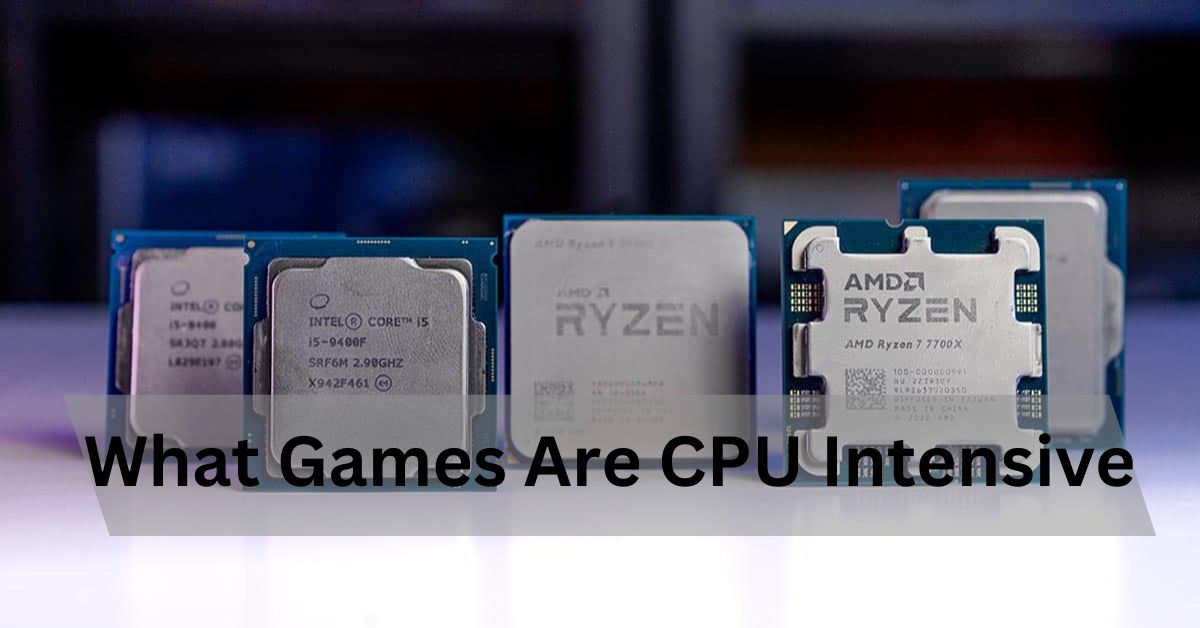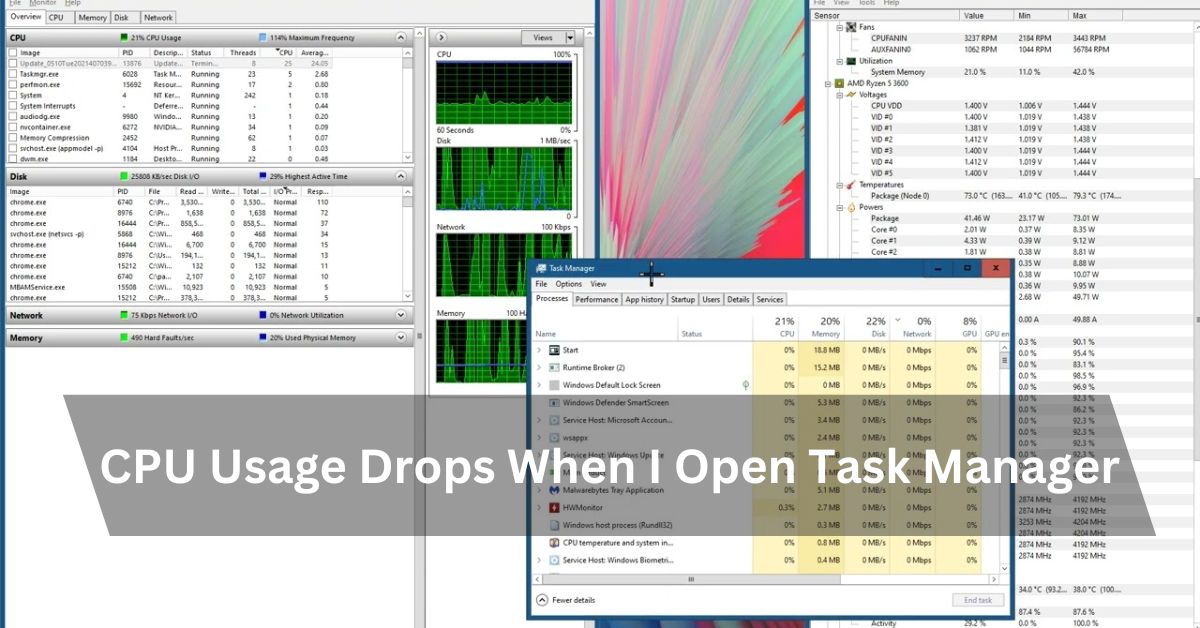A few games appear to overwhelm your PC’s CPU, making your framework heat up, and your fan turn quicker than at any other time. Do you want to know which games use a lot of processing power?
These incorporate procedure games, recreation games, and multiplayer web-based games (MMOs). Procedure games, like Progress or All Out War, require much computation and simulated intelligence handling, which puts a heavier burden on the CPU.
In this article, we’ll investigate what makes a game central processor concentrated, why it is essential, and a few instances of famous titles that fall into this class.
In this way, whether you’re a carefully prepared gamer hoping to streamline your framework or another person to the universe of PC gaming, read on to more deeply study CPU concentrated games and how they can push your equipment as far as possible.
Understanding CPU Intensive Games:
Let’s first understand what it means for a game to be CPU-intensive before moving on to specific examples. In layperson’s terms, games that use a CPU (Central Processing Unit) a lot to handle tasks like physics calculations, artificial intelligence, and complex simulations are CPU-central processing unit-intensive games.
In contrast to GPU (design handling Unit) serious games, which fundamentally depend on the illustrations card to deliver dazzling visuals and impacts, CPU escalated games burden the processor’s capacity to deal with game rationale and execute directions.
That implies that a strong CPU is critical for accomplishing smooth interactivity and ideal execution in these titles.
Also Read: Do I Need Two CPU Power Cables?-Complete Guide
Why It Is Crucial:

You may be asking why it’s fundamental to distinguish CPU-escalated games and guarantee that your framework can deal with them. The response lies in the general gaming experience. A game that pushes your CPU as far as possible can prompt a few issues, including:
1. Poor Performance:
With sufficient central processor power, you might avoid slack, stammering, or outline drops during ongoing interaction, degrading the vivid experience.
2. Heat and fan noise are rising:
As your CPU works harder to handle game information, it produces more intensity, prompting higher temperatures inside your framework. That could make your computer’s cooling system work harder, making more fan noise and affecting how well you play games.
3. Potential Equipment Harm:
Running CPU-concentrated games on a framework unfit to deal with them can put unnecessary weight on your processor, possibly prompting overheating and long-term haul harm if it is not tended to.
Examples of CPU Intensive Games:
Now that we’ve covered the essentials, we should investigate a few instances of famous central processor serious games across different types:
1. Technique Games:
Titles like “Human Progress VI,” “All Out War: Three Realms,” and “Stellaris” are known for their unpredictable ongoing interaction mechanics, requiring the central processor to deal with complex artificial intelligence computations, tact recreations, and enormous scope fights.
2. Reproduction Games:
Games, for example, “Urban Communities: Horizons,” “Microsoft Pilot Training Program,” and “Planet Zoo” are central processors concentrated because of their point-by-point reproductions of city executives, flight material science, and creature conduct, individually.
3. Online games with a lot of players (MMOs):
MMOs like “World of Warcraft,” “Final Fantasy XIV,” and “Guild Wars 2” can use a lot of CPU power, especially in crowded areas or when there are a lot of players competing against each other. The CPU has to deal with many interactions between players and calculations about the environment.
4. Ongoing Procedure (RTS) Games:
Titles like “Star Craft II,” “Period of Domains IV,” and “Company of Legends 2” depend vigorously on the CPU to oversee unit path finding, asset assembling, and battle mechanics progressively, making them requesting on equipment.
5. Open-World Games:
Games, for example, “Red Dead Recovery 2,” “Professional Killer’s Belief Odyssey,” and “Cyberpunk 2077” include massive open universes loaded up with point-by-point conditions, NPCs, and dynamic occasions, all of which require critical CPU ability to deliver and reproduce.
Strategies for Boosting Performance:
If you want to play CPU-concentrated games on your framework, here are a few hints to streamline execution and guarantee a smoother gaming experience:
1. Upgrade Your CPU:
If your ongoing processor is battling to stay aware of requesting games, consider moving up to a more remarkable CPU with higher clock paces and more centers/strings.
2. Screen Your Framework Temperature:
Use programming utilities to screen your CPU temperature while gaming and guarantee that it stays inside safe cutoff points to forestall overheating.
3. Change In-Game Settings:
Bringing down graphical settings, like goal and surface quality, and being hostile to associating can decrease the stress on your CPU and further develop execution without forfeiting a lot of visual devotion.
4. Close Foundation Applications:
Close down superfluous foundation applications and cycles to let loose CPU assets for your game.
5. Keep Your Drivers Refreshed:
Guarantee that your designs, card drivers, and framework profiles are exceptional in exploiting execution improvements and bug fixes.
Also Read: What Is CPU Package Temp?-A Comprehensive Guide
Impact of CPU Intensity on Gaming Experience:

1. Outline Rates and Smooth Interactivity:
- The frame rates and overall smoothness of game play are directly influenced by CPU intensity.
- CPU serious games frequently require handling ability to keep up with high edge rates, prompting smoother interactivity encounters.
2. Load Times and Stacking Screens:
- CPU escalated games might have longer burden times and continuous stacking screens, particularly in open-world or thickly populated conditions.
- The computer chip’s handling power impacts how rapidly the game can stack resources and change between game scenes.
3. Physics and AI Calculations:
- CPU serious games frequently include complex material science reenactments and high-level artificial reasoning (artificial intelligence) schedules.
- These computations require huge CPU assets to precisely reenact sensible associations and ways of behaving inside the game world.
4. Simulation and Strategy Games:
- Real-time strategy (RTS) games, simulation racing games, and simulation city builders all use CPU power.
- These games include overseeing enormous quantities of elements, ascertaining artificial intelligence ways of behaving and reenacting many-sided frameworks, all of which depend intensely on CPU handling power.
Also Read: BIOS Update Needed For New CPU-Complete Guide
FAQ’S:
1. Is the PUBG CPU or GPU concentrated?
PUBG likewise requires a fair CPU to deal with the game’s artificial intelligence, physical science, and the activities of up to 100 players immediately.
2. What makes games’ CPU weighty?
Like most computer games, Reenactment games are hip weighty because of the complicated estimations and calculations expected to mimic different parts of the game.
3. Are FPS games CPU weighty?
Most multiplayer FPS games depend almost no on the CPU compared with the GPU.
4. Is 1080 p more CPU concentrated?
The most probable reason 4 k uses a CPU less than 1080 p is that the fps is lower.
Conclusion:
In conclusion, gamer’s who want to push their hardware to its limits and have the best gaming experience possible may find CPU-intensive games a significant obstacle.
By understanding what makes a game CPU serious, why it is essential, and how to improve execution, you can guarantee that your framework is capable and prepared to handle even the most requested titles.



